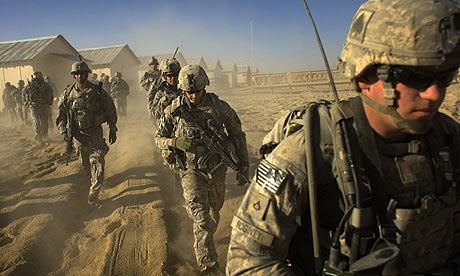
Stephanie Gaskell
U.S. troops went to Afghanistan to battle al Qaeda and its leader Osama bin Laden in retaliation for the Sept. 11, 2001, terrorist attacks. Now, 12 years later, will they stay to battle the Taliban?
During his speech at the United Nations on Tuesday, President Obama said the core of al Qaeda – the terror group that U.S. and NATO troops have been battling for more than a decade – has been dismantled. Afghan Foreign Minister Zalmai Rassoul said he agrees with that assessment, but his country still needs help battling the Taliban.
“[The] Taliban is not powerful enough in Afghanistan, but they continue to disturb our security,” Rassoui told CNN’s Situation Room on Thursday. “One thing that we're focusing on now is the peace process to convince those in Taliban to come to the peace process, join Afghanistan and stop fighting.”
“[The] Taliban is not powerful enough in Afghanistan, but they continue to disturb our security,” Rassoui told CNN’s Situation Room on Thursday. “One thing that we're focusing on now is the peace process to convince those in Taliban to come to the peace process, join Afghanistan and stop fighting.”
On Monday, a Taliban ambush on a border post in southern Afghanistan killed 11 police officers. And earlier this month, Taliban militants used car bombs to attack a U.S. consulate in western Afghanistan, killing two Afghans and wounding 17 other Afghans.
The remaining 60,000 U.S. and NATO forces in Afghanistan are scheduled to leave by the end of 2014, but both sides are still trying to hammer out a deal to keep a small number behind to continue to train and advise the Afghan army and police. At issue is whether those troops would be immune from prosecution under Afghan law while they remain in the country – the same issue that derailed an agreement to leave U.S. troops behind in Iraq.
“The transition of the security has been fairly finished. The third phase has started. We need not a sudden disruption of the security. By the time our security forces are fighting and replacing the NATO forces, we need their training and equipping the Afghan security force,” Rassoui said. “We're in discussions with United States on a security agreement to which a number, a limited number of United States forces and also other NATO forces would stay in Afghanistan.”
Rassoui said he believes that about 10,000 U.S. and NATO troops would stay past 2014, about the same number that top U.S. generals have been floating. But the two sides have yet to be able to sign a Bilateral Security Agreement that sets out immunity and other conditions. U.S. officials ideally would like that agreement in place before next spring’s presidential elections to replace Hamid Karzai. Rassoui is a top candidate to run for the nation’s highest office, but he said he hasn’t yet decided.
Still, as negotiations continue, Rassoui said Afghan-U.S. relations are “solid.”
